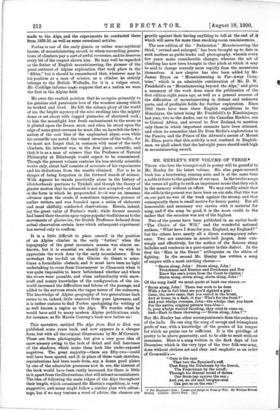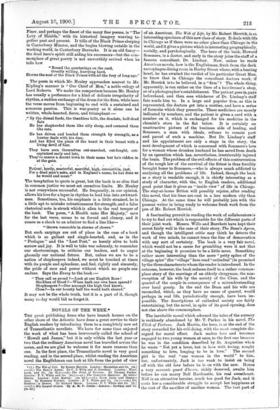MR. HENLEY'S NEW VOLUME OF VERSE.* THOSE who love the
trumpet-call in poetry will be grateful to Mr. Henley for his latest volume. His slim paper-covered book has a heartening, rousing note, and is at the same time a noble tribute to the qualities of our race. In the twelve songs the verses all gallop to such an impetuous music that they stick in the memory without an effort. We may readily admit that the odds in the present war have been on our side, that this was on our part no war of the weak against the strong, and that consequently there is small motive for heroic poetry. But all honourable and necessary war carries with it material for song, and if the song be good, it is the more credit to the maker that the occasion was not of the highest.
Two of the poems have been published in an earlier book, "The Choice of the Will," and the wonderful national anthem, " What have I done for you, England, my England ? " but the others have nearly all a direct contemporary refer- ence. Two are exercises in music-hall jargon, done cun- ningly and effectively, for the author of the famous slang ballades and rondeaus is a past-master in this dialect. In the first the " Man in the Street" soliloquises on the ethics of fighting. In the second Mr. Henley has written a song of empire with a most catching chorus:— "Storm along, John ! Storm along, John ! Frenchman and Russian and Dutchman and Don Know the sea's yours from the Coast to Canton ! Storm along, storm along, storm along, John ! "
Of the song itself we must quote at least one stanza :-
"Storm along, John ! There was work to be done With a foe in full blast ere you'd sighted a gun! Came, the news came, that you reeled in the brunt, And at home, in a flash, it was Who's for the front ? '
And your whelps overseas, John—the whelps that you knew
For the native, original pattern true-blue—
O, your whelps wanted blooding, they cried to come on, And—Hark to them chorusing Storm along, John I' "
But Mr. Henley has other accompaniments than the orchestra of the halls. He can sing the song of savage and triumphant pride of war, with a knowledge of the genius of his tongue for which no praise can be sufficient. It is the privilege of poetry to be above generosity, and to be able to exult without meanness. Here is a song written in the dark days of last December, which is the very type of the true folk-war-song, done without obvious art and clear and emphatic as an order
of Cromwell's :- "Ours is the race
That tore the Spaniard's ruff,
That flung the Dutchman by the breech, The Frenchman by the scruff; Through his diurnal round of dawns Our drum-tap squires the sun ; And yet, an old mad burgher-man Can put us on the run!"
• For England's Sake : Verses and Songs in Time of War. By William Ernest Henley. London : David Nutt. [le.] Finer, and perhaps the finest of the many fine poems, is "The Levy of Shields," with its historical imagery weaving to, gether past and present. It tells of the Black Prince sleeping in Canterbury Minster, and the bugles blowing outside in the working world, in Canterbury Barracks. It is an old fancy— the dead hero's spirit still aiding his successors—but the coni-
monplace of great poetry is not unworthily revived when he tells how "Round the quarterings on the card, Greatly willing, hurrying bard, Storms the soul of the Black Prince with all the fury of long ago."
• The poem in which Mr. Henley approaches nearest to Mr. Kipling's manner is " Our Chief of Men," a noble eulogy of Lord Roberts. We make the comparison because Mr. Henley has usually a preference for a kind of delicate irregularity of rhythm, .a. sudden exchange of the drum for the flute, while here the verse moves from beginning to end with a sustained and sonorous passion. This is war-poetry as it alone can be written, whole-hearted, fierce, and triumphant :— By the dismal fords, the thankless hills, the desolate, half-dead flats He has shepherded them like silly sheep, and cornered tbotu like rats.
He has driven and headed them strength by strength, as a bunter deals with his deer,..
And has filled the place of the heart in their breast with a living devil of fear.
They have seen themselves out-marched, out-fought, ont- captained early and late, They've scarce a decent town to their name but he's ridden in at the gate.
Patient, hardy, masterful, merciful, high, irresistible, just, For a dead man's sake, and in England's name, he has done as he would and must."
The temptation to quote is great, but the book is so slim that in common justice we must set ourselves limits. Mr. Henley is not everywhere successful. He frequently, in our opinion, allows his love for a lapse in rhythm to lead him into awkward- ness. • Sometimes, too, his emphasis is a little strained, he is a little apt to mistake robustiousness for strength, and a false rhetorical note is struck which is alien to the real temper of the book. The poem, "A Health unto Her Majesty," save for the last verse, seems to us forced and clumsy, and it comes as a shock to an admirer to find a line like- " Grown venerable in storms of cheers."
But such earplugs are out of place in the case of a book which is so gallant and single-hearted, and, as in the " Prologue "' and the " Last Post," so keenly alive to both sorrow and joy. It is well to take war solemnly, to remember our shortcomings, to criticise our leaders, and to augur gloomily our national future. But, unless we are to be a nation of shopkeepers indeed, we must be touched at times with ite purple and splendour, and feel, rightly and sincerely,
the pride of race and power without which no people can endure. Says the Envoy to the book:— "They call us proud P—Look at our English Bose ! Shedders of blood P—When bath our own been spared P Shopkeepers P—Our accompt the high God knows. Close P—In our bounty half the world hath shared."
It may not be the whole truth, but it is a part of it, though many to-day would bid us forget it.



































 Previous page
Previous page